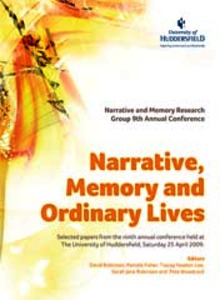How do people remember bereavement? How do they find and refine the language to express it? And why do they agree to talk publicly about it, for a book and a drama-documentary?
I am an oral historian, a journalist and broadcaster. I am not a therapist or a sociologist. So this paper will not explore the psychological complexities of bereavement. Nor will it set out to offer a textual analysis of people‘s expressed feelings about the death of a close friend or family member. Instead, it will concentrate on the experience of interviewing people about death and bereavement, the language and imagery they use to express their grief, and how writers may use those experiences as the basis for both fiction and non-fiction.
Over the years, I have interviewed many bereaved people, for oral history projects, newspaper articles and radio programmes. Five years ago, together with my Radio 4 colleague, Judy Merry, I edited a collection of personal testimonies on the subject (Relative Grief, published by Jessica Kingsley, 2005).
Our interest stemmed from personal experience. Not unnaturally, both Judy and I have experienced bereavement. My father died 16 years ago of heart failure. Along with other family members, I was there at his bedside when he breathed his last. Three months later, I was with my husband in the hospital watching my mother-in-law die.
Downloads
Downloads per month over past year
Downloads per month over past year for
"narrativecover09tn.jpg"
Downloads per month over past year for
"NarrativeChapter9_Clare_Jenkins.pdf"

![narrativecover09tn.jpg [thumbnail of narrativecover09tn.jpg]](https://eprints.hud.ac.uk/9584/1.hassmallThumbnailVersion/narrativecover09tn.jpg)


 CORE (COnnecting REpositories)
CORE (COnnecting REpositories) CORE (COnnecting REpositories)
CORE (COnnecting REpositories)